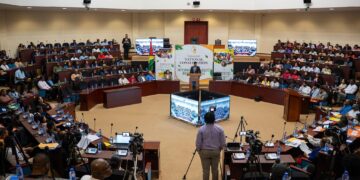The Guyana Trade Union Congress (GTUC) has put forth a series of bold recommendations in preparation for Budget 2024, including a call for the abolition of personal income tax, commonly known as Pay-As-You-Earn (PAYE). These recommendations were presented following a meeting with government officials, including Prime Minister Mark Phillips and Finance Minister Dr. Ashni Singh, as well as representatives from Guyana’s trade unions.
In their proposal, the GTUC emphasized the need for the abolition of personal income tax (PAYE) while advocating for the adjustment of the minimum pension provided by the National Insurance Scheme (NIS). They proposed that a comprehensive review of NIS be conducted to ensure that the minimum pension reflects 75% of the state’s minimum wage.
Additionally, the GTUC recommended activating NIS unemployment laws and establishing provisions for individuals between jobs to receive unemployment benefits for a specified maximum duration, helping them sustain their basic needs while seeking new employment opportunities.
The GTUC also proposed an increase in the old-age pension to $50,000. The government has previously aimed to raise the old-age pension to $40,000 by 2025. The current monthly pension stands at $33,000, up from $28,000 in 2022 and $25,000 in 2021.
Furthermore, the GTUC called for direct cash transfers from oil and gas revenues through cash transfer programs. These programs aim to provide financial assistance to low-income individuals and households at risk of falling into poverty. Property owners were also included in the recommendations, with the proposal for property owners to receive direct and indirect cash transfers through interest-free or low-interest rate soft loans to improve and maintain their properties and immediate surroundings.
Additionally, the GTUC suggested establishing a program with a dedicated fund to assist first-time homeowners, offering them a grant of $3,000,000 to purchase a home. Another recommendation focused on encouraging citizens to invest in clean energy through cash transfers for solar, wind energy, and other sustainable development programs. The GTUC’s proposals align with Guyana’s Low Carbon Development Strategy (LCDS) 2030, which seeks to promote sustainable and renewable energy sources.
The GTUC’s recommendations come at a crucial time as the government prepares to develop Budget 2024, aiming to address key economic and social challenges while promoting equitable development in the country.


















































